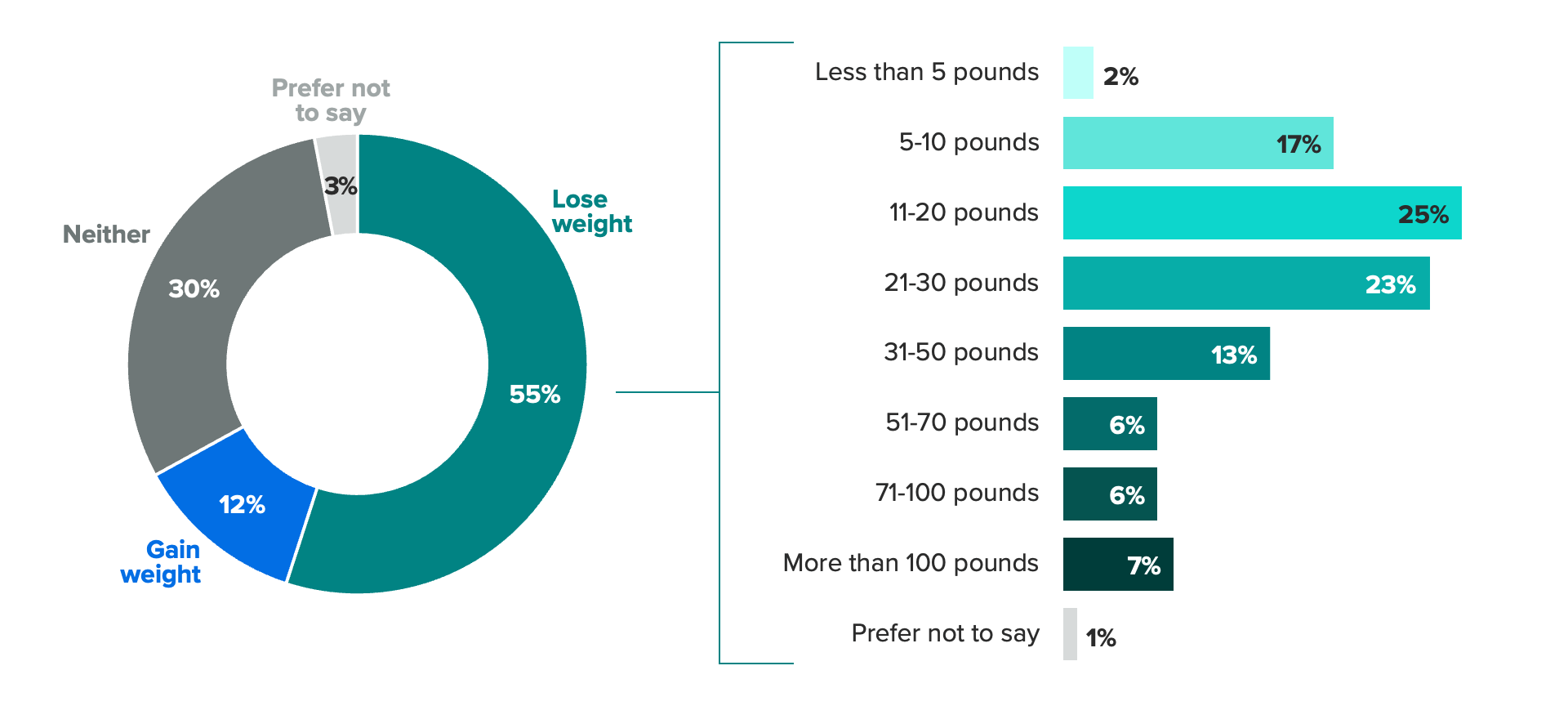Around 3 in 10 U.S. Adults Are Interested in Trying Ozempic, Other GLP-1s for Weight Loss

Key Takeaways
Roughly 3 in 10 U.S. adults are interested in trying prescription medications known as GLP-1s for weight loss.
In a nation preoccupied with dieting, the promise of an easy weight loss solution is enticing, even if it carries a high price tag.
These medications have the potential to reshape the landscape of the weight loss industry, including food and beverage products, but concerns about long-term safety and efficacy remain. For now, most consumers are sticking with tried-and-true lifestyle changes to help them shed pounds.
Sign up for Our Best Intel for our daily briefing on the most important data, charts and insights from Morning Consult.
GLP-1 prescription medications, such as Ozempic, Wegovy and Mounjaro, have recently surged in popularity as weight loss aids. This has many food & beverage brands, and the diet industry at large, questioning how Americans will approach weight loss in the future. And rightfully so: Nearly 3 in 10 U.S. adults are interested in trying these prescription drugs for weight loss. But many consumers have yet to make up their minds on the long-term benefits of GLP-1 medications, marking an important opportunity to assess what’s driving interest in these weight loss tools.
Weight loss drugs strike a nerve with a nation of dieters
Despite consumers’ skepticism and a growing backlash against “diet culture,” beliefs and habits related to weight loss and management are culturally ingrained. U.S. adults are more likely than not to say they need to lose weight. And it’s not just a few pounds they’re interested in shedding: Among those who said they need to slim down, more than half reported that they need to lose more than 20 pounds

As a result, about half (48%) of U.S. adults have experience with dieting. For most dieters or potential dieters, physical health is their main impetus. Appearance also matters, even amid an increase in conversations around body positivity and body neutrality. More of those who said they were currently dieting or planning to start cited improving physical health (76%) as a major reason, but improving physical appearance was named as a major reason by 64%.
Many U.S. adults are interested in trying prescription drugs for weight loss
Amid this backdrop of dieting and weight loss prevalence, enter GLP-1s. Not only have the drugs received broad national news coverage, but they are also a hot topic of conversation in Hollywood, whether from stars who condone, condemn or deny their use. Media proliferation is translating to awareness: Roughly 4 in 10 U.S. adults (39%) said they’ve heard at least something about prescription medications that rely on semaglutide, like Ozempic, Wegovy and Mounjaro. Among the groups with the highest awareness are high earners (54%) and current dieters (53%), demographics that have the greatest means and/or potential desire for these medications.
Consumers aren’t just hearing about GLP-1s; they’re interested in trying them too. Roughly 3 in 10 U.S. adults (29%) said they are interested in trying drugs like Ozempic, Wegovy or Mounjaro for weight loss. That share climbs substantially among those who said they had heard of the medications prior to this survey (47%). Since awareness levels are elevated among high earners and dieters, those groups were among the most likely to express interest in trying.
There’s also a gender divide. Men were less likely to say they need to lose weight than women, and among those who did say they need to lose weight, men were more likely than women to put their weight loss needs on the lower end of the spectrum. Yet men were also more likely than women to express interest in trying these drugs. That could be because fewer men than women expressed serious concerns about the cost and the side effects, both short- and long-term.
Ozempic and other GLP-1s rank low across a range of weight loss approaches
Despite their interest in these potentially game-changing drugs, consumers are still more comfortable using tried-and-true methods to lose weight. Increasing physical activity and following a specific diet are far and away the top weight loss approaches that pique the interest of those looking to slim down. Consumers consider these so-called lifestyle changes to be both safe and effective for losing weight and keeping it off.
Notably, when it comes to medical interventions, interest in prescription drugs outranks interest in surgery. The latter may feel like a more drastic commitment, and although the guidelines for eligibility have recently been expanded, they have historically been relatively narrow. Consumers have some safety concerns about weight loss surgery — nearly 2 in 5 said they believe it is not safe, although a similar share said they believe it is safe.
Questions remain around the safety, effectiveness of prescription weight loss injections
The relative newness of GLP-1s, combined with the lingering unease left by myriad other weight loss “miracles” over the past decades (like fen-phen in the 1990s), is leading to general skepticism and uncertainty about this new group of drugs. GLP-1s fell to the bottom of the list when consumers were asked which weight loss methods are safe and effective for losing weight and keeping it off. It’s not that consumers think prescription weight loss injections are ineffective or unsafe, per se; rather, pluralities of consumers are simply unsure or have no opinion on the safety and efficacy of GLP-1s. In other words, the proverbial jury is still out.
Awareness greatly increases perceptions of efficacy: 67% of those who had previously heard of these drugs believe they would be effective for losing weight, and 60% believe they would be effective for keeping weight off long term, compared with just 37% and 34%, respectively, among the general public.
In addition to the unknowns about long-term efficacy and safety, cost has been a big part of the conversation surrounding GLP-1s. Among those interested, 87% said they were concerned about the cost. Yet that concern might not hold people back: Roughly half (49%) of those who said they’d be interested said they “definitely” or “probably” would pay $1,000 a month for the drugs; that climbs to 61% among those currently dieting to lose weight.
One factor that is not a barrier for consumers: asking their doctors for a prescription. Among those interested, 85% said they’d be comfortable asking their doctor to prescribe a medication for weight loss.
Prescription drugs could change how Americans lose weight in the future
Given a majority of U.S. adults say they want to lose weight, it’s no wonder that a crop of medications with the potential to make that challenge easier has captured national attention. For now, most consumers are wary of the as-yet-unknown long-term impact of these prescriptions. In light of these concerns, most are inclined to (try to) stick with dietary changes and exercise for now, but further awareness, experience and understanding over time will surely lead to significant changes in the future of the weight loss industry.
Emily Moquin previously worked at Morning Consult as a lead food & beverage analyst.